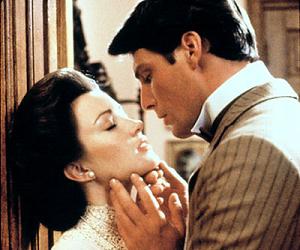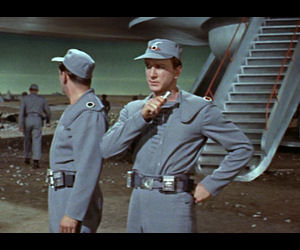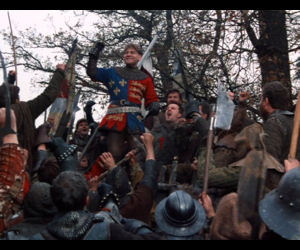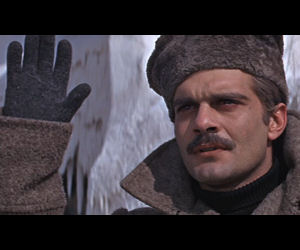Top 5 Movies that Remind Me of My Father
Tomorrow will mark the one-year anniversary of my father's death. One of the ways I like to remember him is through the things we both enjoyed, whether it's playing the piano, obsessing over politics, or reading about theoretical physics. Many of my best memories involve movies, because we spent crazy amounts of time watching them, talking about them, and hypothesizing about movies that hadn't come out yet. We'd try to cast our favorite fictional characters, quiz each other on actors, film musicians, and directors, and compare our typically harmonious likes and dislikes. I remember seeing a few movies together, just him and me, like Groundhog Day and Queen of the Damned. It never really mattered what the movie was or how good or bad it was, it was always a fountainhead for conversation and contemplation. It was one of the many ways we bonded.
With that in mind, there are certain movies that are inextricably linked to my memories of him. These five are the big ones, but this is by no means a comprehensive list, nor is it an adequate list of my father's favorite movies (neither would be complete without West Side Story, at least one John Wayne movie, a Dirty Harry flick, a few great war films, and some Sherlock Holmes). No, these are the top five that speak to me in a very personal way, that remind me of something Dad taught me, and that I simply cannot watch without remembering him. These are the movies I come back to, not just to enjoy them, but to honor my father.
#5
Somewhere in Time
|  |
#5
Somewhere in Time
|  |
I can list dozens of movies that my father liked more for their soundtracks than anything else, like Dances with Wolves, Out of Africa, or just about any other movie scored by John Barry. Still, everybody knows that the movie with his favorite soundtrack was Somewhere in Time, but he didn't love it just for its music. Dad also loved the story, which he admitted was a sappy time travel romance (as if there's something wrong with that), and he adored the actors, especially Jane Seymour, his celebrity crush. It is a good movie that I watched many times growing up, but I don't think I ever fully appreciated it until I read the Richard Matheson book upon which it is based. That book, originally called Bid Time Return, is one of my favorite novels, and introduced me to a subset of speculative fiction (the umbrella term that includes sci-fi and fantasy) known as "magical realism." The book explains things that the movie doesn't, and it leaves the ending far more open to interpretation than the movie does. I'm not one to sit here and talk about how the book is always better (if you want, I can list a few examples of the movie being better than the book), so I'll just say that my love of the novel has actually increased my love of the movie. And yes, the soundtrack is amazing. It's often the same music that plays in my head whenever I remember my father.
#4
Casablanca
|  |
#4
Casablanca
|  |
I came home from college one weekend after reading Round Up the Usual Suspects: The Making of Casablanca and spending the better part of one of my film classes analyzing the film from every possible angle, practically frame-by-frame. Thanks to that class and book, I probably know more about Casablanca than any other movie, and it's hard to find a better bit of celluloid to have that much knowledge about. It is consistently ranked among the top five greatest films ever made, and it has always been one of my parents' favorites. Perhaps I was just trying to prove that their investment in my education was worth something when, that weekend, I suggested we watch the film so that I could share with them my new, encyclopedic knowledge of it. Luckily for me, they were fascinated, and it took us nearly four hours to make it through the movie, pausing every few minutes so I could elaborate on some bombshell of information I had just dropped. My father was so enthralled, in fact, that he borrowed my copy of Round Up the Usual Suspects and spent the next year or two talking about it. It is one of the few times I know of that I genuinely impressed him, and that is a comforting, happy memory.
#3
Forbidden Planet
|  |
#3
Forbidden Planet
|  |
One thing that I shared with Dad more than any other member of my family is a love of science-fiction. Don't get me wrong; I come from a tribe of incurable geeks and Trekkies, but the only person in the house who I could talk to about the classics--Asimov, Verne, Wells--as well as slightly more contemporary stuff--Crichton, Clarke, Gibson--was my father. He was incredibly well versed in science-fiction, and he was the one who taught me that you can and should take it seriously. When the subject of sci-fi movies came up in conversation, my father would inevitably start talking about Forbidden Planet, which he often cited as his favorite. And why shouldn't it be? It has lots of great things in it, from mind-blowing concepts of long-dead alien races and the psychological possibilities of technology that can turn thought to reality to a young Leslie Nielson in a serious role. It's one of those stories that can be appreciated on multiple levels. You can watch it and enjoy the schlocky 1950's sci-fi sensibilities--it feels more like an old radio show sometimes than a movie--or you can delve really deep into its themes and motifs and find some surprising subtexts just beneath the surface. It took me many, many years after Dad first told me about it before I actually saw it for myself, but all the build-up didn't affect my reaction. It's a great movie, and I am eternally grateful to my father for introducing it to me.
#2
Henry V (1989)
|  |
#2
Henry V (1989)
|  |
My father was never the Shakespeare fanatic that I've become, but he did appreciate the bard's tales. Though I participated in a school version of Macbeth when I was a kid (I played the doctor--probably the smallest role in the whole play--as a testament to my woefully lacking stage talents), it wasn't until I watched the Mel Gibson version of Hamlet with my father that I started to "get" Shakespeare. I was too young to understand a tenth of what was being said, of course, but Dad explained in detail everything that was happening, without censoring the more adult subject matter or patronizing me. It was like he had thrown open a door to an amazing new world of understanding, of drama, of literature, and of poetry. It was an enormously important moment for me, and one of the concrete pieces of my childhood that I can point to when I try to explain why I'm a writer. Still, despite Mel Gibson's Hamlet being my entry-point into that world, the Shakespeare movie that most reminds me of my father is Kenneth Branagh's Henry V, because that was easily his favorite. Dad agreed with me that Laurence Olivier is probably the greatest Shakespeare film actor who has ever drawn breath, but Branagh's Henry, as epitomized by his stunning rendition of the St. Crispin's Day speech, is unmatched, even by the great Olivier. More than that, though, Henry V reminds me of my father because of its romanticizing of history and its exploration of the fascinating pull of glory and horror that is war, things that spoke to him even more than they speak to me. I could probably watch the Mel Gibson Hamlet without thinking much about my father, but it's impossible for me to watch Henry V (any version, really) and not spend the whole time reflecting on how much he loved it.
#1
Dr. Zhivago
|  |
#1
Dr. Zhivago (1965)
|  |
Growing up, all I knew about Dr. Zhivago was that it was Dad's favorite movie of all time, that it was ridiculously long (well over three hours), and that my mother would never let him watch it. (I would later figure out that he never watched it, not because Mom wouldn't let him, but because he rarely had that much free time and, when he did, he couldn't sit still and watch anything for more than three hours without falling asleep.) One day when I was about 13 or so, I tried to watch it by myself to see what the big deal was. Honestly, I found it boring and pointless, and I gave up on it after the ninety minute mark. A couple of years later, I would watch it again, this time with my father in the room, and I had no problem sitting through the entire epic. As we were watching it, he explained that the whole story is a complex allegory of Russian history, that every character represents something specific and that every seemingly insignificant detail is symbolic of some abstract concept. Like with Hamlet a few years earlier, my father was unwittingly teaching me something that would deeply shape my future as a writer. I was familiar with what an allegory was, but all the examples they give you in school are simple, obtuse, and/or unrelatable. You might be told something vague like Alice's Adventures in Wonderland is an allegorical satire of the British upper class, but without a detailed explanation, that doesn't mean much to an adolescent. After my father explained Dr. Zhivago point-by-point, however, I fully came to appreciate the power and the mind-blowing possibilities of allegorical storytelling. Nowadays, I look for allegories everywhere (even in episodes of SpongeBob SquarePants), and whenever I write, I try to throw in as many allegories and subtexts as I possibly can, hoping that, somewhere, some reader's mind will be blown the way mine was when I watched Dr. Zhivago with my old man.
-e. magill 9/27/2011
|
|